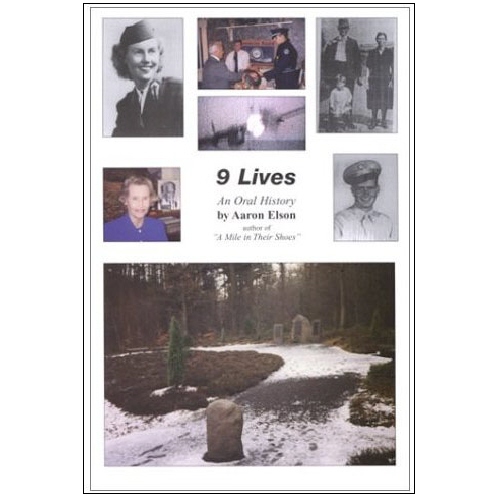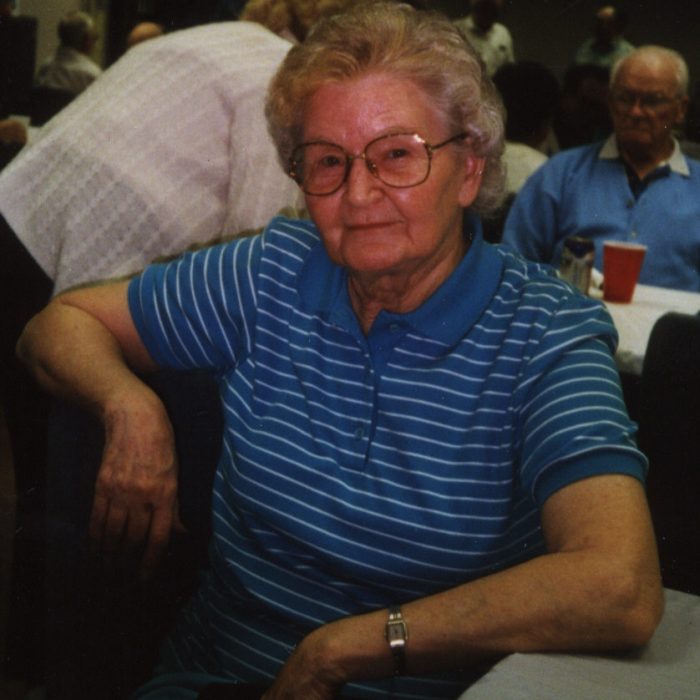
Jeannie Roland (excerpt)
I met Jack when he was at Pine Camp, up in New York State, and I was teaching school. One of my students was going with a soldier out there, so I had a car and I took her out there and I met Jack, and every time that we’d get in that car to head for Watertown, New York, the state troopers would stop us. I hadn’t been driving very long and I was scared anyway, and the first time they stopped me, I thought, “Oh my God, what have I done?” They wanted to see my driver’s license and the registration to be sure that I owned the car and that I wasn’t some soldier’s girlfriend that was just driving.
After it happened three or four times, when they’d stop me I’d laugh and they’d say, “Well, you’ve been stopped before.” Because they didn’t think I looked old enough to be driving.
I was just out of college then. When Jack and I were in Georgia, I was walking down the street one day and this old lady was out sweeping her lawn. There was no grass, but she was out there with this whisk broom, and she said, “You’d better hurry, little girl, you’ll be late for school.” And I thought, “Little do you know. …”

We were married in August of ’42 in Phenix City, Alabama. I got off the train, which I’d been on for a day and a half, and Jack wouldn’t wait till the next day. It was 9:30 at night, and we went over the bridge from Columbus, Georgia, to Phenix City, went up on the hill to the judge’s home; there were cabs lined up out there, a lot of other young people were getting married, too.
Phenix City, Alabama, was also called Sin City. I’m sure the judge was busy during the day, downtown, but he lived way up on a hill, it looked down at night, it was quite a beautiful sight. Well, people were lined up there, people waiting to get married.
It cost two dollars. No blood test. They asked what my address was and Jack spoke up and said 600 Broad Street, Columbus, Georgia, which was where we were going to live. So the judge started the ceremony, his wife sat at a desk, and he’s standing up there in front of us and reading off this rigamarole, and she’s there filling out official papers, and there are two kids on the floor under the desk playing Monopoly, and Jack got anxious and kissed me, and the judge said, “Now if you’ll wait just a few minutes, son, this will be all over. …”
What was it like when Jack was overseas? It was hell. I was teaching school, in another small town, over towards Elmira. When he came home, I hadn’t heard from him for weeks. When the war ended, he was in Germany having his appendix taken out. The war in Europe ended in May, and he came home in September.
I weighed 104 pounds. I weighed 120 went he went overseas. I was so frantic, not knowing where he was. I boarded with a woman who was a volunteer for the Red Cross, and she came and called up the stairway one day and said, “Jean, how long has it been since you’ve had any word from Jack?”
And I said “Eight weeks.”
She said, “Would you like me to do something about it?”
I said, “Yes.” A lot of mail was lost, there were all kinds of complications, but I was worried to death.
I had lost so much weight that Jack said when he got off that train, if he’d taken a good look at me, he’d have gone back. The bones in my hips were showing. But it was no worse for me than it was for anybody else. I’m sure.
Jack was wounded in the summertime. I was at my mother and father’s house in Friendship, New York, when the letter came, and I opened it up, and he said, “I have been wounded and I’m in the hospital in England.” Well, I got in my car and took off for my friend’s house, I was so upset, and my father started looking for me all over town, now what in the world is she going to do? In a few days I got a telegram from the War Department, but I’d already had the letter.
That was at the end of July and he was in the hospital until Thanksgiving. He went back in time for the Battle of the Bulge. He was hit in the front and the back. Penicillin had just come out as a treatment and they used to put it in the shoulder, and it was mixed with oil I guess and stung like mad, and he just about punched out the nurse one night, and finally he said, “Don’t come in here and give me a shot until you know that I am thoroughly awake.” Because it hurts a lot. I’ve heard Les O’Riley talk about how uncomfortable that darn stuff was. But of course I’m sure it saved a lot of lives, too.
Jack was in a jeep when he was wounded. His driver, I can’t tell you for sure if his driver was killed or if he’s the one that lost his legs, I’m not positive. Because when Jack came home from overseas he was not the same person that went. And we didn’t talk about it. He never did tell me a whole lot about what went on. He had nightmares. He’d get up out of bed in the middle of the night and get in the car and disappear.
But I don’t think any of these men came home the same as they went.
Before he went away, we laughed, and laughed and laughed. Everything was lovely. And he was just more serious, but also, he was just not himself.